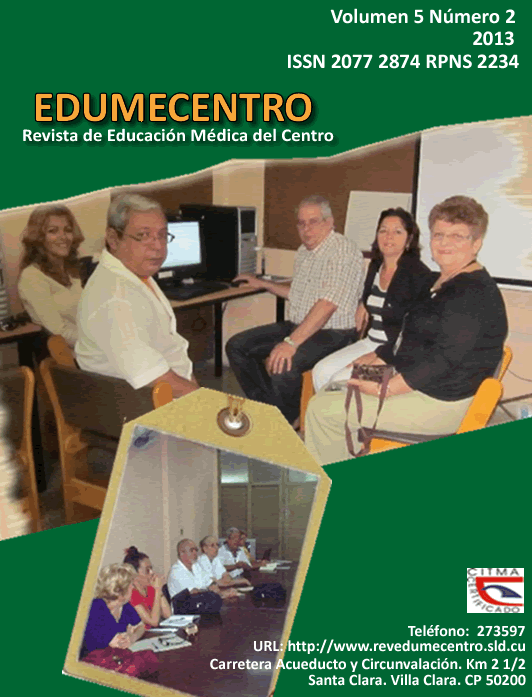Life support courses: experience to be considered for dealing with emergencies
Keywords:
Life support, Teacher upgrading, Medical emergencies, Emergencies.Abstract
Background: In accordance with the sustained development of the national health system and considering the need to improve the care of critically ill patients, several postgraduate courses on vital support were given in Villa Clara between 1997 and 2003. Objective: To describe the experiences gained in the teaching of these courses. Methods: A descriptive study, with a pedagogical approach, was conducted based on the results obtained with the courses. Theoretical, empirical and mathematical methods were applied. Results: 221 courses were held with the participation of 4 388 students. The courses more commonly taught were Prehospital Life Support (AVIPREH), Advanced Cardiovascular and Brain Life Support (AVIACAC) and Advanced Trauma Life Support (AVIAT). In the courses, 84.10 % of students graduated; and as positive aspects are noted their proper organization, the correspondence of the goals with the expectations of students, the assimilation of the skills and practice to face emergency situations and the excellent preparation of teachers. Conclusions: The results were satisfactory, which justifies the need for a new series of courses at suitable intervals, in order to train professionals and health technicians, as well as other sectors and the general population, in the techniques of rehabilitation; all this in spite of some negative aspects such as the amount of content to be taught in a short period of time, the lack of some teaching aids for practice and the rigorous evaluations.
Downloads
Published
How to Cite
Issue
Section
License
Los autores que publican en esta revista están de acuerdo con los siguientes términos:- Los autores/as conservarán sus derechos de autor y ceden a la revista el derecho de primera publicación de su obra, el cuál estará simultáneamente sujeto a una Licencia Creative Commons Reconocimiento-NoComercial-CompartirIgual 4.0 Internacional (CC BY-NC-SA 4.0) que permite a terceros compartir la obra siempre que se indique su autor y su primera publicación esta revista.
- Los autores pueden establecer por separado acuerdos adicionales para la distribución no exclusiva de la versión de la obra publicada en la revista (por ejemplo, situarlo en un repositorio institucional o publicarlo en un libro), con un reconocimiento de su publicación inicial en esta revista.
- Se permite y se anima a los autores a difundir sus trabajos electrónicamente (por ejemplo, en repositorios institucionales o en su propio sitio web) antes y durante el proceso de envío, ya que puede dar lugar a intercambios productivos, así como a una citación más temprana y mayor de los trabajos publicados (Véase The Effect of Open Access) (en inglés).










